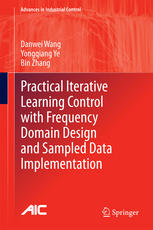

Most ebook files are in PDF format, so you can easily read them using various software such as Foxit Reader or directly on the Google Chrome browser.
Some ebook files are released by publishers in other formats such as .awz, .mobi, .epub, .fb2, etc. You may need to install specific software to read these formats on mobile/PC, such as Calibre.
Please read the tutorial at this link: https://ebookbell.com/faq
We offer FREE conversion to the popular formats you request; however, this may take some time. Therefore, right after payment, please email us, and we will try to provide the service as quickly as possible.
For some exceptional file formats or broken links (if any), please refrain from opening any disputes. Instead, email us first, and we will try to assist within a maximum of 6 hours.
EbookBell Team

5.0
80 reviewsThis book is on the iterative learning control (ILC) with focus on the design and implementation. We approach the ILC design based on the frequency domain analysis and address the ILC implementation based on the sampled data methods. This is the first book of ILC from frequency domain and sampled data methodologies. The frequency domain design methods offer ILC users insights to the convergence performance which is of practical benefits. This book presents a comprehensive framework with various methodologies to ensure the learnable bandwidth in the ILC system to be set with a balance between learning performance and learning stability. The sampled data implementation ensures effective execution of ILC in practical dynamic systems. The presented sampled data ILC methods also ensure the balance of performance and stability of learning process. Furthermore, the presented theories and methodologies are tested with an ILC controlled robotic system. The experimental results show that the machines can work in much higher accuracy than a feedback control alone can offer. With the proposed ILC algorithms, it is possible that machines can work to their hardware design limits set by sensors and actuators. The target audience for this book includes scientists, engineers and practitioners involved in any systems with repetitive operations.